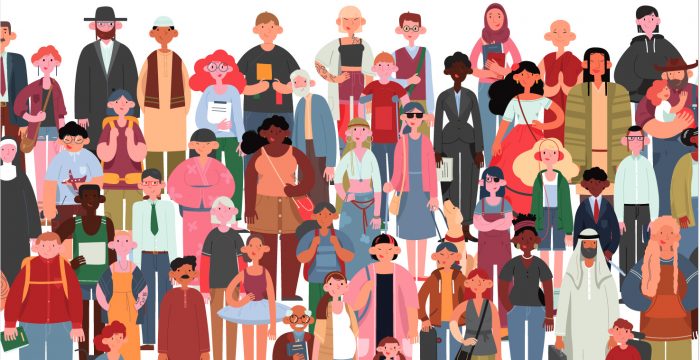
A special issue of The American Journal of Physical Anthropology, whose cover art is shown above, tackles race and racism. (Courtesy of American Journal of Physical Anthropology)
Biological Anthropologists Grapple with Racism in Journal Issue Co-edited by UF Professor
UF anthropology professor Connie Mulligan has co-edited a special issue of the American Journal of Physical Anthropology that confronts issues of race and racism.
The June 2021 issue features 16 scientific and commentary articles from a diverse group of authors from areas such as anthropological genetics, forensic anthropology and biological anthropology. The contributors explore how to address challenges such as racial health disparities and contend with how the field has approached race in the past.
“This issue is particularly timely given the racial health disparities that were revealed, once again, by the COVID-19 pandemic and the global protests on structural racism and police brutality that have been illustrated so poignantly this past year,” Mulligan, PhD, said.

In her own contribution to the issue, Mulligan explains how the trauma of racism can negatively affect mental and physical health — and may even impact people’s genes. She proposes the possibility that systemic racism leaves epigenetic signatures that can be inherited, perpetuating health disparities and racial inequities over generations.
The article builds on Mulligan’s research into how traumatic experiences among women in the Congo and Syrian refugees sometimes leave genetic imprints that can be passed down.
“The idea that racism-associated epigenetic changes could play a role in maintaining racial inequities is speculative,” Mulligan said, “but existing research supports the premise and discussion is needed to ensure that potentially harmful epigenetic effects are acknowledged and mitigated.”
The issue also serves as an opportunity to reckon with the biological anthropology field’s past and future in grappling with race and racism. Contributors reflect on the discipline’s history of marginalizing Black people and other groups, provide guidance for discussing race sensitively and accurately, and reveal how white nationalists have co-opted genetic and anthropological data. Another perspective piece calls for forensic anthropologists to stop providing estimates of individuals’ ancestry to law enforcement.
While the topics are often challenging, addressing them is urgent, Mulligan said. “The events of 2020 strikingly illustrate how structural exclusion acts within and affects our own discipline,” she and co-editor Jennifer A. Raff of the University of Kansas write in the issue’s introduction.
Read the special issue here.


